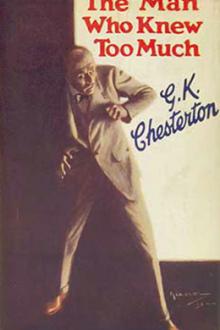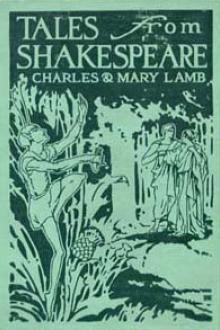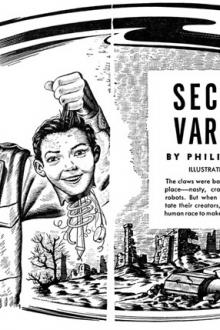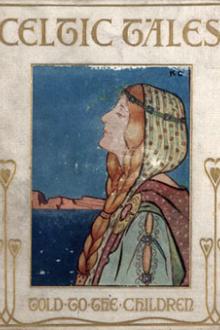Genre Fiction. Page - 261

oking for them here."
March thought of asking him what he was looking for; but, feeling unequalto a technical discussion at least as deep as the deep-sea fishes,he returned to more ordinary topics.
"Delightful sort of hole this is," he said. "This little delland river here. It's like those places Stevenson talks about,where something ought to happen."
"I know," answered the other. "I think it's because the place itself,so to speak, seems to happen and not merely to exist.Perhaps that's what old Picasso and some of the Cubists are tryingto express by angles and jagged lines. Look at that wall likelow cliffs that juts forward just at right angles to the slopeof turf sweeping up to it. That's like a silent collision.It's like a breaker and the back-wash of a wave."
March looked at the low-browed crag overhanging the greenslope and nodded. He was interested in a man who turnedso easily from the technicalities of science to those of art;and asked him if he admired the new angular art

hey had refused to execute her wicked commands. Thesegentle spirits were ever after obedient to the will of Prospero.Of these Ariel was the chief.
The lively little sprite Ariel had nothing mischievous in hisnature, except that he took rather too much pleasure intormenting an ugly monster called Caliban, for be owed him agrudge because he was the son of his old enemy Sycorax. ThisCaliban, Prospero found in the woods, a strange misshapen thing,far less human in form than an ape: he took him home to his cell,and taught him to speak; and Prospero would have been very kindto him, but the bad nature which Caliban inherited from hismother, Sycorax, would not let him learn anything good or useful:therefore he was employed like a slave, to fetch wood and do themost laborious offices; and Ariel had the charge of compellinghim to these services.
When Caliban was lazy and neglected his work, Ariel (who wasinvisible to all eyes but Prospero's) would come slyly and pinchhim, and sometimes tumble him d

and timid!"
I liked his spirit. "One day we shall be lions and eagles and bold prophets! Then our tongue shall taste much beside India and Cathay!"
"Well, I hope it," he said. "Mice running under the headlands."
He fell silent, cherishing his knees and staring into the fire. It was not Juan Lepe's place to talk when master merchant talked not. I, too, regarded the fire, and the herded mountains robed in night, and the half-moon like a sail rising from an invisible boat.
The night went peacefully by. It was followed by a hard day's travel and the incident of the road. At evening we saw the walls of Zarafa in a sunset glory. The merchants and their train passed through the gate and found their customary inn. With others, Juan Lepe worked hard, unlading and storing. All done, he and the bully slept almost in each other's arms, under the arches of the court, dreamlessly.
The next day and the next were still days of labor. It was not until the third that Juan Lepe considered that

of it to him too, for he had the pleasure of thinking of it all his life long, and of being envied and courted by all his family besides.' And Ralph always wound up these mental soliloquies by arriving at the conclusion, that there was nothing like money.
Not confining himself to theory, or permitting his faculties to rust, even at that early age, in mere abstract speculations, this promising lad commenced usurer on a limited scale at school; putting out at good interest a small capital of slate-pencil and marbles, and gradually extending his operations until they aspired to the copper coinage of this realm, in which he speculated to considerable advantage. Nor did he trouble his borrowers with abstract calculations of figures, or references to ready-reckoners; his simple rule of interest being all comprised in the one golden sentence, 'two-pence for every half-penny,' which greatly simplified the accounts, and which, as a familiar precept, more easily acquired and retained in the memory than any know

and the villainy which rendered us more than ever impatient of delay. In my fly-blown blankets I dreamt of London until I hankered after my chambers and my club more than after much fine gold. Never shall I forget my first hot bath on getting back to Melbourne; it cost five shillings, but it was worth five pounds, and is altogether my pleasantest reminiscence of Australia.
There was, however, one slice of luck in store for me. I found the dear old Lady Jermyn on the very eve of sailing, with a new captain, a new crew, a handful of passengers (chiefly steerage), and nominally no cargo at all. I felt none the less at home when I stepped over her familiar side.
In the cuddy we were only five, but a more uneven quintette I defy you to convene. There was a young fellow named Ready, packed out for his health, and hurrying home to die among friends. There was an outrageously lucky digger, another invalid, for he would drink nothing but champagne with every meal and at any minute of the day, and I have

o immediately fell to talking again and finally, with his head tipped back, sniffed the air in the direction of the tree above them and then suddenly pointing toward the carcass of Bara, the deer, he touched his stomach in a sign language which even the densest might interpret. With a wave of his hand Tarzan invited his guest to partake of the remains of his savage repast, and the other, leaping nimbly as a little monkey to the lower branches of the tree, made his way quickly to the flesh, assisted always by his long, strong sinuous tail.
The pithecanthropus ate in silence, cutting small strips from the deer's loin with his keen knife. From his crotch in the tree Tarzan watched his companion, noting the preponderance of human attributes which were doubtless accentuated by the paradoxical thumbs, great toes, and tail.
He wondered if this creature was representative of some strange race or if, what seemed more likely, but an atavism. Either supposition would have seemed preposterous enough did he

. He wore a faded blue sweater, ragged with dirt, and short pants. His hair was long and matted. Brown hair. It hung over his face and around his ears. He held something in his arms.
"What's that you have?" Hendricks said sharply.
The boy held it out. It was a toy, a bear. A teddy bear. The boy's eyes were large, but without expression.
Hendricks relaxed. "I don't want it. Keep it."
The boy hugged the bear again.
"Where do you live?" Hendricks said.
"In there."
"The ruins?"
"Yes."
"Underground?"
"Yes."
"How many are there?"
"How--how many?"
"How many of you. How big's your settlement?"
The boy did not answer.
Hendricks frowned. "You're not all by yourself, are you?"
The boy nodded.
"How do you stay alive?"
"There's food."
"What kind of food?"
"Different."
Hendricks studied him. "How old are you?"
"Thirteen."
* * * * *
It wasn't possible. Or was

among the bracken but a few paces apart.
'What beast wouldst thou slay?' cried Deirdre, affrighted.
'It was no beast,' said Nathos, 'but yonder among the bracken lieth a deadman, if my javelin missed not its mark.'
In fear and wonder Deirdre ran to the spot. No man lay there, but she sawon the bracken the form of a crouching man. She saw, too, the tracks thatmarked his escape.
Nathos followed her, and stooped to take his javelin from the ground. Andthere, beside it, lay a wooden-hilted knife.
'It is as I thought,' he said. 'This knife is used but by the hillmen whoare in bondage to Concobar. The King seeketh my life. Go thou, then, backto thy lonely cottage, and await that day when he shall make thee hisQueen.'
'Ask me not to turn from following thee, O Nathos, for thy way must bemine, this day and ever.'
'Come, then,' and Nathos took her by the hand.
Through the shadowy forest they walked swiftly, until of a sudden he badeher rest among the bracken. Then went he forward and

the heaven, the embodiment of light, heat, and the breath of life, produced offspring who were of a much less material nature than his son Oceanus. These other children of his were supposed to occupy the intermediate space which divided him from Gæa. Nearest to Uranus, and just beneath him, came Aether (Ether), a bright creation representing that highly rarified atmosphere which immortals alone could breathe. Then followed Aër (Air), which was in close proximity to Gæa, and represented, as its name implies, the grosser atmosphere surrounding the earth which mortals could freely breathe, and without which they would perish. Aether and Aër were separated from each other by divinities called Nephelae. These were their restless and wandering sisters, who existed in the form of clouds, ever {13} floating between Aether and Aër. Gæa also produced the mountains, and Pontus (the sea). She united herself with the latter, and their offspring were the sea-deities Nereus, Thaumas, Phorcy

m 295 416. Zeugma 295 417. Pros to semainomenon 296 418. Apposition 296 419. Collectiveness 297 420. Reduction 297 421. Determination of part of speech 298 422-424. Convertibility 298, 299 425. The Blacks of Africa 299 426. None of your ifs 300 427. Convertible words numerous in English 300
CHAPTER II.
SYNTAX OF SUBSTANTIVES.
428. Rundell and Bridge's 301 429. Right and left 301
CHAPTER III.
SYNTAX OF ADJECTIVES.
430. Pleonasm 302 431. Collocation 302 432. Government 302 433. More wise, wiser 303 434. The better of the two 304 435. Syntax of adjectives simple 304
CHAPTER IV.
SYNTAX OF PRONOUNS.
436. Pleonasm 305 437. Father's, not father his 305 438. Pleonasm and